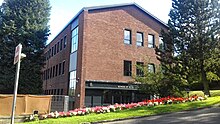Garscube House
 |
|
|
Former names
|
Glasgow Veterinary College |
|---|---|
| Type | Veterinary school |
| Established | 1862 |
| Dean | Prof Ewan R Cameron |
|
Administrative staff
|
300 |
| Undergraduates | 500 |
| Postgraduates | 95 |
| Location |
Glasgow, Scotland 55°54′00″N 4°19′08″W / 55.900°N 4.319°WCoordinates: 55°54′00″N 4°19′08″W / 55.900°N 4.319°W |
| Colours | |
| Affiliations | University of Glasgow |
| Sports | Rugby football |
| Website | www.gla.ac.uk/schools/vet |
The School of Veterinary Medicine at the University of Glasgow is one of six veterinary schools in the United Kingdom, and offers undergraduate and postgraduate qualifications in Veterinary Medicine.
It was established in 1862 as the independent Glasgow Veterinary College, being subsumed into the University in 1949 and gaining independent faculty status in 1969. In 2010 it became a constituent school of the new College of Medical, Veterinary and Life Sciences. It ranked second in the UK by the Complete University Guide 2016 and in 2015, QS World University Rankings ranked the veterinary school seventh in the world for veterinary medicine.
In 1859, James McCall, Professor of Anatomy and Physiology at the Dick Veterinary College in Edinburgh, moved to Glasgow and started a practice in Hope Street, from which he gave informal lectures in veterinary medicine. In 1862, formal classes were instituted and the practice moved to a larger accommodation, a set of stables at 399 Parliamentary Road.
In 1863, a royal warrant was issued which established McCall's enterprise as the Glasgow Veterinary College and entitled its students to examination at the Royal College of Veterinary Surgeons; the first graduate qualified in 1865. The College was the second veterinary school in Scotland, after the Dick School in Edinburgh, McCall's alma mater, which was established in 1823. In 1873, it moved to much larger facilities in Buccleuch Street, a former pumping station, and merged into the University of Glasgow in 1949. The current Vet School was built on the Garscube Estate in 1970.
The School is now based at the Garscube Estate in Bearsden, on the outskirts of Glasgow, purchased by the University in 1948 from Sir George Campbell of Succoth. Sir George was a descendent of Ilay Campbell, Lord Succoth, who had studied Law at the University and later served as Lord President of the Court of Session and Rector of the University. The main Garscube House had been used as a hospital during the Second World War. The School has a farm, a Small Animal Hospital and an Equine Hospital on the Estate, as well as the James Herriot Library, named for Alf Wight, a graduate of the School who wrote under that name. The University's Wolfson Halls are also situated on the Estate, as is the Garscube Sports Complex, used by the School's student rugby team as well as other students and sports clubs in the University.
...
Wikipedia
